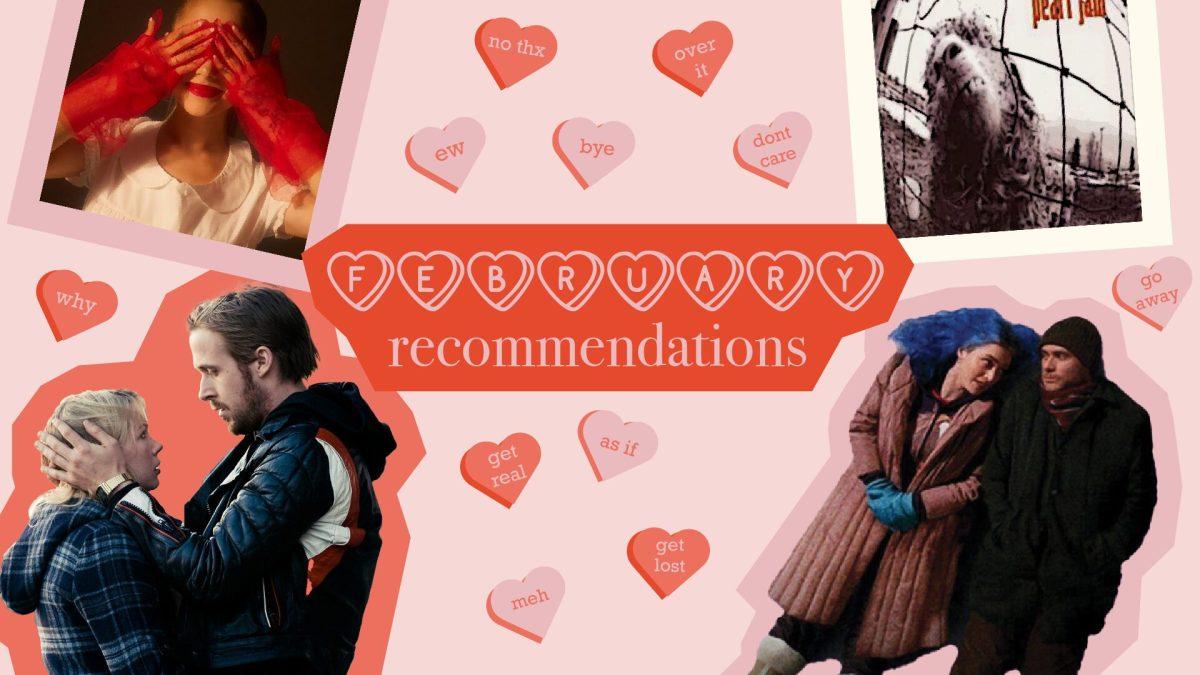
A guide of recommendations filled with anti-love culture to get you through February
Welcome to February, a month that Hallmark has trademarked as the month of love. To me, Valentine’s Day has always been more of a cash grab than a day of love. With that mentality, I’ve always been more interested in media that explores the concept of heartbreak.
Watch:
The 2004 film “Eternal Sunshine of the Spotless Mind,” introduces viewers to the characters Joel and Clementine, played by Jim Carrey and Kate Winslet. The two are drawn to each other despite their flaws and mistakes. After their relationship ends, Joel learns Clementine underwent a procedure to have her memory of him erased.
Devastated, Joel undergoes the same procedure in hopes of moving on. The film unfolds within this process of memory erasure, which can be seen as a metaphor for the human tendency to avoid the pain and complexity inherent in love. Yet even as they try to erase each other from their minds, Joel and Clementine’s connection persists.
“Eternal Sunshine of the Spotless Mind” has been ranked as my No. 1 movie on Letterboxd for years and I always recommend it to others. To me, nothing can top it. In this film, Carrey shows he is worth more than his one-note comedy roles.
I’ve never seen a movie that makes me feel more seen or on edge. The film explores some of the difficulties and realities of borderline personality disorder. As someone who has been diagnosed, I thought “Eternal Sunshine of the Spotless Mind” explored the personality disorder well.
The 2010 film “Blue Valentine,” directed by Derek Cianfrance, focuses on the complexities, challenges and eventual breakdown of a relationship, showing a dark side to love. The film explores the disparity between a relationship’s passionate, idealized beginnings and the emotional toll that time, unmet expectations and personal differences can have on a couple.
The film depicts how love does not always lead to happiness or fulfillment. It contrasts the early stages of the relationship where Dean, played by Ryan Gosling, and Cindy, portrayed by Michelle Williams, are in love and full of hope. Years later, the relationship became strained, full of resentment and miscommunication.
Why is it that any movie where Ryan Gosling sings makes me cry? I’m looking at you, “La La Land.” I’ve only watched “Blue Valentine” twice: once when I was single and the other while in my current relationship. When I was single and watching the film, it didn’t really resonate with me. I thought it was a sad movie and moved on. Recently, my boyfriend and I watched “Blue Valentine” together, and it made us emotional about what the future could hold. I would give anything not to end up like Dean and Cindy.
Listen:
I had never been a huge fan of pop music. I always thought it lacked emotion and perspective, but Ariana Grande blew me away with her album “eternal sunshine,” inspired by the movie previously mentioned. Grande uses the album as a tell-all from her recent divorce with Dalton Gomez.
In the song “i wish i hated you,” Grande expresses the desire to feel anger or resentment toward her ex-partner. Grande sings about how she wishes she could hate the person she’s still emotionally entangled with. Instead, she’s stuck feeling all these residual feelings — confusion, hurt and even some bittersweet affection.
With a crack in her voice, Grande sings,
“I wish I hated you / I wish that weren’t true / Wish there was worse to you / Wish you were worse to me.”
Moving on to my signature sound: grunge. The first time I heard “Rearviewmirror” by Pearl Jam, it was mind-altering. The song embodies the raw, liberating feeling of leaving behind a damaging relationship. “Rearviewmirror” is about breaking free from someone who has held you back and the sense of relief that comes with moving on. The track is full of imagery about getting away — literally and figuratively. Singer-songwriter Eddie Vedder uses a rearview mirror as a symbol of looking back, representing his desire to distance himself from the past and leave it behind. There is no nostalgic longing or regret; there is only the decision to move on and never look back.
Read:
Retired punk rocker turned author Henry Rollins is my favorite novelist. I don’t find his intensity as exorbitant; instead, I see it as intriguing. Rollins’ 2022 memoir, “Sic,” at its core explores enmity for love. In the novel, Rollins writes heartbreaking poems and entries about the loss in his life. Rollins is known for his gritty, no-holds-barred style. In “Sic,” love isn’t portrayed as an uplifting experience. Instead, it’s more like an itch that can’t be scratched, an unhealthy obsession or even a cruel joke played by life.
In “Sic,” Rollins explores his feelings and survivor’s guilt from seeing his best friend, Joe Cole, killed in front of him. Knowing Rollins’ background explains his anger and his outlook on life and love. Instead of looking for a partner, Rollins focuses on his writing. He can’t allow himself to love after losing Cole. Like many of his other books, “Sic” kept me hooked, and I finished it in one sitting. I just could not put it down. University of Missouri students are lucky enough to have a collection of Rollins’ books in Ellis Library. I beg you to pick one up — you will not regret it.
Whether you’re in a relationship or single this February, I urge you to take this month to appreciate the media around you.
Edited by Alyssa Royston | [email protected]
Copy edited by Avery Copeland
Copy edited by Natalie Kientzy | [email protected]
Edited by Emilia Hansen | [email protected]
Edited by Annie Goodykoontz | [email protected]